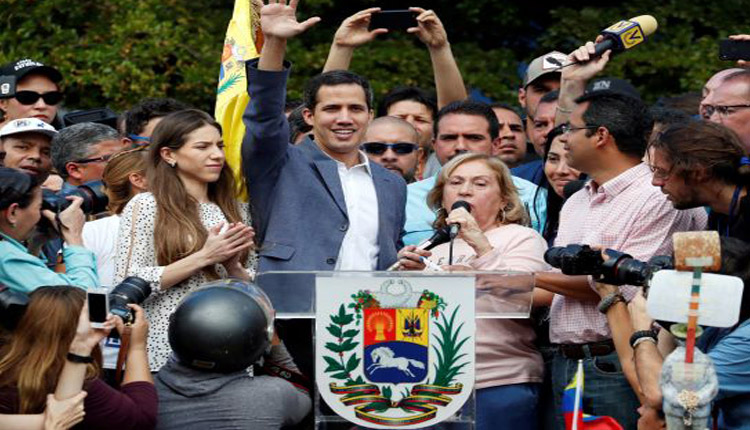Venezuela’s Guaido pursues U.S. Pentagon to cooperate on solving political crisis
Venezuelan opposition leader Juan Guaido said he has asked his envoy to the United States to meet with Pentagon officials to “cooperate” on a solution to the South American country’s political crisis.
Guaido, the leader of the opposition-controlled National Assembly, added he had received word from China that the country would join a diplomatic effort between European and Latin American countries, known as the International Contact Group on Venezuela, to negotiate an end to the crisis.
In January, Guaido invoked the OPEC nation’s constitution to assume an interim presidency, arguing President Nicolas Maduro’s 2018 re-election was illegitimate. He has been recognized by most Western and Latin American countries, but Maduro has retained the support of allies China, Russia and Cuba.
Guaido’s effort to oust Maduro so he can take power and call new elections has stalled in recent weeks, after an attempted military uprising on April 30 was put down. Guaido told an Italian newspaper this week that he would “probably” accept a U.S. military intervention if the United States proposed it.
“We have instructed our ambassador Carlos Vecchio to meet immediately … with the Southern Command and its admiral to establish a direct relationship,” Guaido said at a rally in Caracas on Saturday. “We have said from the beginning that we will use all the resources at our disposal to build pressure.”
Representatives of the U.S. Southern Command and Vecchio did not immediately respond to requests for comment. Trump administration officials have repeatedly said that “all options are on the table” to oust Maduro, who calls Guaido a U.S. puppet seeking to oust him in a coup.
The Southern Command said in a tweet on Thursday that it was prepared to discuss “how we can support the future role” of Venezuelan armed forces leaders who “restore constitutional order,” when invited by Guaido.
Venezuela’s Information Ministry did not immediately respond to a request for comment. Defense Minister Vladimir Padrino separately said on Saturday that a U.S. Coast Guard ship had entered Venezuelan territorial waters, which he said “we will not accept.”
A Southern Command spokesman had said on Friday that a U.S. Coast Guard vessel was conducting a “counterdrug detection and monitoring mission” in “international waters” in the Caribbean Sea on May 9.
Guaido was speaking at a rally in support of opposition lawmakers who have been arrested, taken refuge at foreign embassies in Caracas, and been threatened in recent days amid a broad crackdown by Maduro against congress after the April 30 uprising.
Most Latin American countries, as well as the European Union, have expressed opposition to potential military intervention in Venezuela. EU foreign policy chief Federica Mogherini said last week the contact group is prepared to begin a “mission at the political level” in Caracas.


